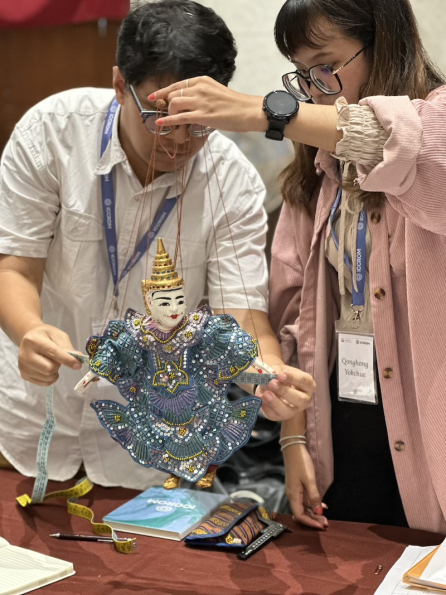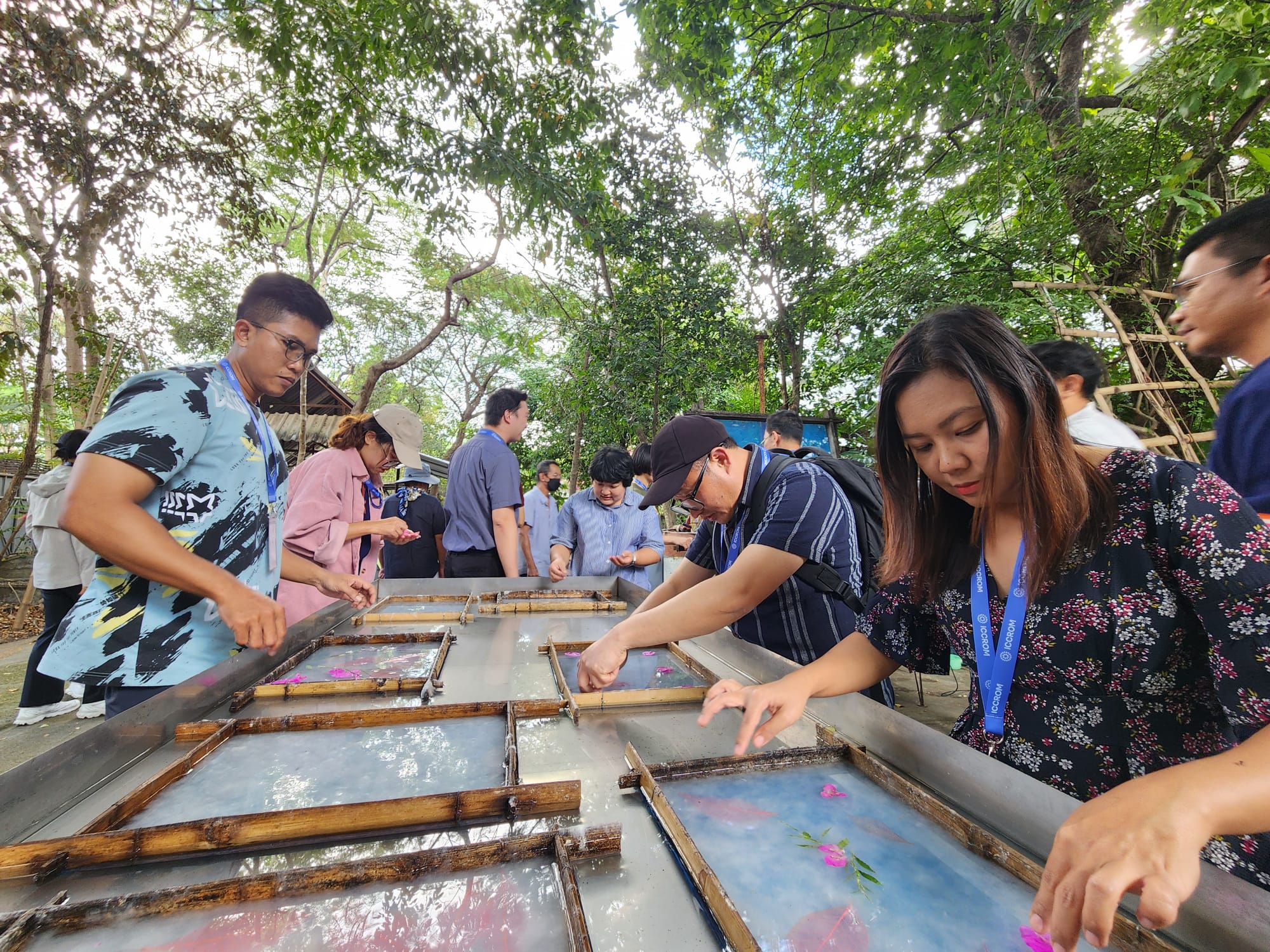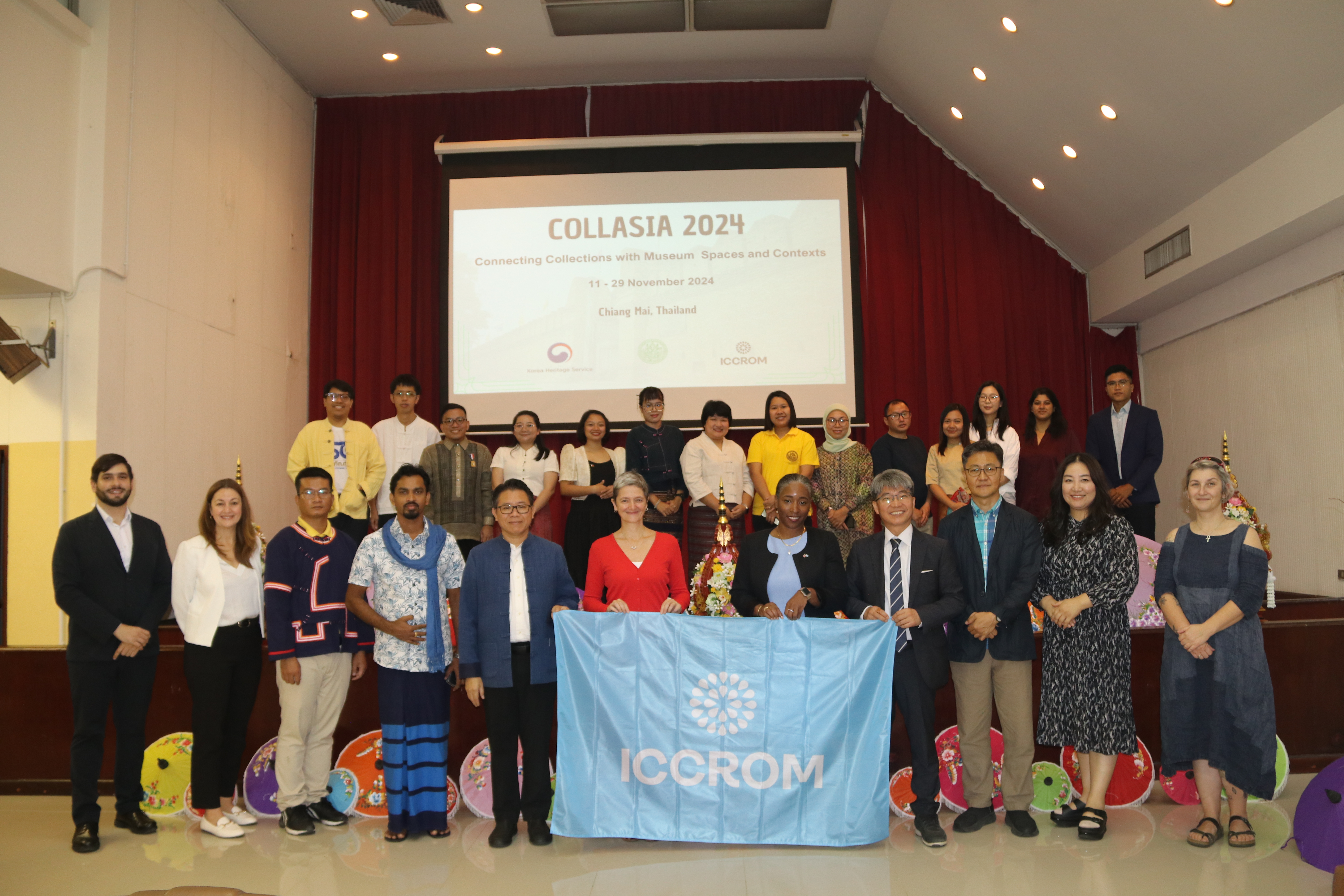The CollAsia 2024 course, titled "Connecting Collections with Museum Spaces and Contexts" kicked off last week in Chiang Mai, Thailand.
Museums and collection-based institutions are deeply linked with the communities they serve. This connection underscores the importance of considering social and broader cultural contexts in conservation and care practices, where decisions must be viewed through the lens of community wellbeing and the Sustainable Development Goals.
The CollAsia 2024 course, "Connecting Collections with Museum Spaces and Contexts," integrates traditional knowledge with scientific principles to foster sustainable practices in collection care and museum management. By understanding the principles of alteration and deterioration while at the same time recognizing the cause-and-effect relationships between individual objects and broader contexts, heritage professionals can make informed conservation decisions. This comprehensive approach ensures that conservation practices are grounded in a wider social and environmental setting that considers the diverse factors influencing heritage collections in our ever-changing world.
The course, hosted at the Chiang Mai National Museum, has brought together 19 heritage professionals from across Asia to learn and exchange ideas knowledge against the backdrop of Thailand's second largest city, known for its handicrafts and vibrant festivals. The participants come from diverse career backgrounds, including conservation, sustainable tourism, museum interpretation, curation, education, and research. Collectively, they bring over 300 years of experience and speak more than 23 languages, highlighting the group's diversity and the wealth of learning possibilities.
A Collaborative Effort
This course is a partnership between ICCROM, the National Research Institute for Cultural Heritage of the Korea Heritage Service, and the Fine Arts Department under the Ministry of Culture of Thailand.
During the opening ceremony, ICCROM's Director-General, Aruna Francesca Maria Gujral, welcomed participants via video message, emphasizing the value of their diverse perspectives and experiences.
“CollAsia is renowned for providing engaging lectures, hands-on exercises, and group tasks, all designed to inspire and equip you with tools to bring back to your institutions and practices,” she noted. “What you will learn in these weeks will allow you to make sound conservation decisions that will ultimately contribute to healthier communities and a healthier planet.”
The Director-General of the 7th regional office of the Fine Arts Department of Thailand, Mr. Chinnawut Winyalai, echoed these sentiments, stating, “Preserving our cultural heritage is not just about taking care of objects; it is about safeguarding our identity and history. I believe each of you has the potential to contribute to a brighter future for our cultural heritage. Let’s share our knowledge and experiences to collectively advance our profession.”
Lee Kilbai, Director of the Planning and Coordination Division at the National Research Institute of Cultural Heritage of the Republic of Korea, added, “Asia is home to an exceptionally rich history and diverse cultural treasures. The National Research Institute of Cultural Heritage is deeply honoured to once again contribute to the hosting and operation of the CollAsia programme. Building on the vibrant exchanges among Asian researchers, we will continue to create opportunities for sharing knowledge on the sustainable conservation of cultural heritage and the value it holds for all of humanity.”
Highlighting Global Support
During the first week, the course was honoured by the presence of Ms. Dionandrea Shorts, the Alternate Permanent Representative of the U.S. Mission to the United Nations Agencies in Rome. Her participation underscored the long-standing support of the United States for ICCROM's work and mandate. In her remarks during the opening ceremony, she emphasized the importance of global collaboration in heritage conservation:
“With its global network of cultural heritage experts such as yourselves, ICCROM is well placed to build the capacity of professionals to protect and preserve their national traditions and traditional knowledge while also advancing economic livelihoods. We will only succeed in preserving a culture for the future generations, here in Southeast Asia and around the world, if we break out of our silos of expertise and work together. We must recognize that our global challenges can only be met with global solutions. And we believe that everyone gathered in this room and these types of trainings are a good start.”
Exploring Cultural Practices and Sustainability
The course began during the Yi Ping and Loy Krathong festivals in Chiang Mai, where the city is adorned with lanterns and alive with cultural and religious activities. These cultural practices were integrated into the course, with participants documenting the traditions and associated objects. The course includes several site visits to cultural sites, offering participants the chance to learn more about local crafts and traditions.
Notably, study visits to museums impacted by the recent flooding in Northern Thailand in October highlights the urgent need to address the effects of climate change and the behavioral changes necessary to achieve sustainability within our conservation practices.
About CollAsia
ICCROM's CollAsia programme, launched in 2003 and supported by the Republic of Korea since 2012, empowers heritage collections professionals in the Asia-Pacific region. The programme focuses on integrating traditional knowledge and scientific principles into conservation practices. By promoting the use of local materials and methods, CollAsia reduces reliance on imports, lowers costs, and fosters partnerships with local producers and industries. This approach also strengthens connections to living craft traditions and expertise beyond the formal heritage sector.
CollAsia emphasizes critical thinking, decision-making, and scientific literacy, moving away from fixed solutions. Participants are encouraged to conduct applied research to address conservation challenges unique to their institutions. The programme aims to create a ripple effect, enabling museums to engage more effectively with their communities. Participants are expected to share their knowledge by training colleagues, ensuring a lasting impact on heritage conservation across the region.



